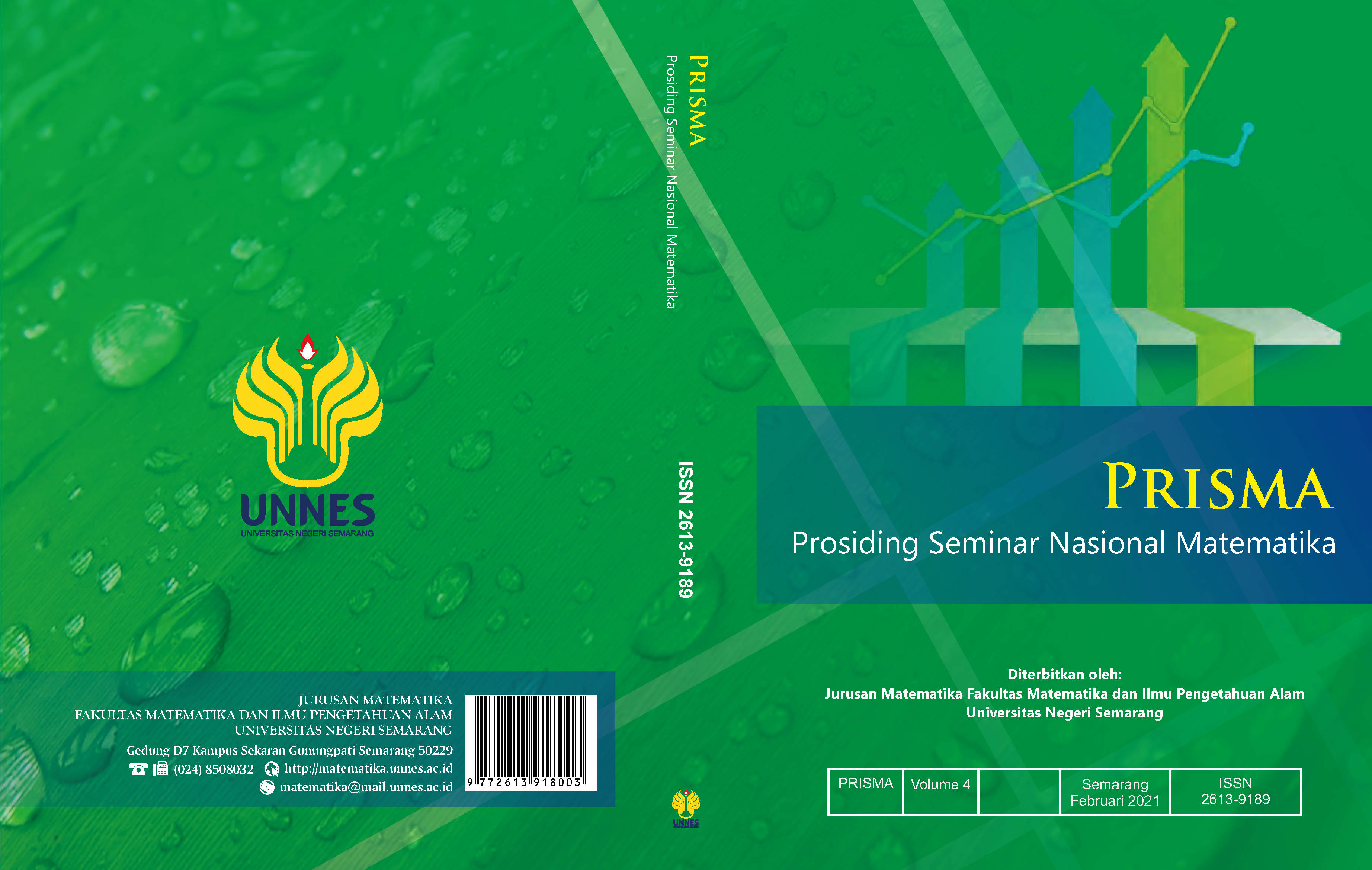Why It’s Important to Advance STEAM in Mathematics Classroom
Main Article Content
Abstract
This article explains about how is the positive impact in advancing STEAM Education in mathematics classrooms. The discussion starts with the fact that STEM education has received much attention to achieve the competencies needed in the 21st century in the last decades. However, STEM education, which tends to override arts education, encourages reforms in this approach. Seeing the importance of art education as a basis for developing creativity and character in society gives a chance for STEAM education and integration of STEM education with art education, which is believed to impact students' learning achievement and engagement positively. As one of the integration components in STEAM, mathematics will get a positive impact too. Mostly by looking at the fact that the students' ability in mathematics competence is still low refers to the result of the national exam, AKSI, PISA, and TIMSS. Some of the main reasons why it's important to advance STEAM education in mathematics classroom include honing high order analytical thinking skills (HOATS), honing students' C2PC abilities, and enhancing students' engagement in the mathematics classroom.
Article Details
References
Bush, S. B., Cox, R., & Cook, K. L. (2016). A critical focus on the M in STEAM. Teaching Children Mathematics, 23(2), 110–114. http://search.ebscohost.com/login.aspx?direct=true&db=ehh&AN=118046073&site=ehost-live
Choi, J. H., & Hwang, B. K. (2018a). The Concepts, Strategies and Application of STEAM Education in South Korea. Proceedings - 2017 7th World Engineering Education Forum, WEEF 2017- In Conjunction with: 7th Regional Conference on Engineering Education and Research in Higher Education 2017, RCEE and RHEd 2017, 1st International STEAM Education Conference, STEAMEC 201, 466–469. https://doi.org/10.1109/WEEF.2017.8467045
Choi, J. H., & Hwang, B. K. (2018b). The STEAM education proliferation activities on schools its related sites using mobile STEAM trailers. Proceedings - 2017 7th World Engineering Education Forum, WEEF 2017- In Conjunction with: 7th Regional Conference on Engineering Education and Research in Higher Education 2017, RCEE and RHEd 2017, 1st International STEAM Education Conference, STEAMEC 201, 193–196. https://doi.org/10.1109/WEEF.2017.8467090
Dewanti, S. S., Kartowagiran, B., Jailani, J., & Retnawati, H. (2020). Lecturers’ Experience in Assessing 21St-Century Mathematics Competency in Indonesia. Problems of Education in the 21st Century, 78(4), 500–515. https://doi.org/10.33225/pec/20.78.500
Helms, M., Moore, R., Edwards, D., & Freeman, J. (2017). STEAM-based interventions: Why student engagement is only part of the story. 2016 Research on Equity and Sustained Participation in Engineering, Computing, and Technology, RESPECT 2016 and 2nd Annual Conference of the IEEE Computer Society’s Special Technical Community on Broadening Participation, STCBP 2016 - Co-Located with The . https://doi.org/10.1109/RESPECT.2016.7836171
Herro, D., Quigley, C., Andrews, J., & Delacruz, G. (2017). Co-Measure: developing an assessment for student collaboration in STEAM activities. International Journal of STEM Education, 4(1). https://doi.org/10.1186/s40594-017-0094-z
Kang, N.-H. (2019). A review of the effect of integrated STEM or STEAM (science, technology, engineering, arts, and mathematics) education in South Korea. Asia-Pacific Science Education, 5(1). https://doi.org/10.1186/s41029-019-0034-y
Kelley, T. R., & Knowles, J. G. (2016). A conceptual framework for integrated STEM education. International Journal of STEM Education, 3(1). https://doi.org/10.1186/s40594-016-0046-z
Kerdthaworn, P., & Chaichomchuen, S. (2019). EasyChair Preprint A Learning model of STEM Education on cloud computing technology , to promote learning and innovation skills for students practicing teachers A Learning model of STEM Education on cloud computing technology , to promote learning and inn. EasyChair Preprints, 1(1630).
Kney, A. D., Tatu, J. C., Marlin, M., & Meng, X. (2016). Transforming STEM to STEAM ( Work in Progress ): How a Traditionally Run STEM Camp Succesfully Incorporated the Arts into Its Framework. 1–4.
Mullis, I. V. S., Martin, M. O., Foy, P., & Hooper, M. (2015). TIMSS 2015 International Results in Mathematics.
OECD. (2018a). PISA 2015 Results in Focus. Columbia University. https://doi.org/10.1596/28293
OECD. (2018b). What 15-year-old students in Indonesia know and can do. Programme for International Student Assessment (PISA) Result from PISA 2018, 1–10. http://www.oecd.org/pisa/ Data
Park, H., Byun, S., & Sim, J. (2016). Teachers ’ Perceptions and Practices of STEAM Education in South Korea. 12(7), 1739–1753. https://doi.org/10.12973/eurasia.2016.1531a
Petrick, C., King, B., & González, D. (2016). The STEAM behind the scenes. 22(1), 46–49.
Puspendik, K. (2019a). Laporan Hasil AKSI SMP 2019. Https://Aksi.Puspendik.Kemdikbud.Go.Id/Laporan/. https://aksi.puspendik.kemdikbud.go.id/laporan/
Puspendik, K. (2019b). Laporan Hasil Ujian Nasional. Hasilun.Puspendik.Kemendikbud.Go.Id. https://hasilun.puspendik.kemdikbud.go.id/#2019!smp!capaian_nasional!99&99&999!T&03&T&T&1&!1!&
Ruangsiri, K., Nuangpirom, P., & Akatimagool, S. (2020). Promotion of High-Order Analytical Thinking Skills using NCOM Simulator through STEAM Education. 2020 7th International Conference on Technical Education (ICTechEd7), Bangkok, Thailand, 19–23.
Salmon, G. (2019). May the Fourth Be with You: Creating Education 4.0. Journal of Learning for Development (JL4D), 6(1), 95–115. www.etymonline.com/word/lecture%0Ahttps://jl4d.org/index.php/ejl4d/article/view/352
Sumardyono. (2020). Pendidikan STEAM di Indonesia: Fakta dan Harapan. KNPMP V UMS, 1–7.
University Online, L. (2019). New Skills: 4 Benefits Of STEAM Education. Teach Thought We Grow Teacher. https://www.teachthought.com/technology/benefits-of-steam-education/
Wardono, & Mariani, S. (2018). The analysis of mathematics literacy on PMRI learning with media schoology of junior high school students. Journal of Physics: Conf. Series 983, 012107, 1–10.
Yakman, G. (2008). STEAM EDUCATION an overview of creating a model of integrative education. Foreign Affairs, 91(5), 28. https://doi.org/10.1017/CBO9781107415324.004
